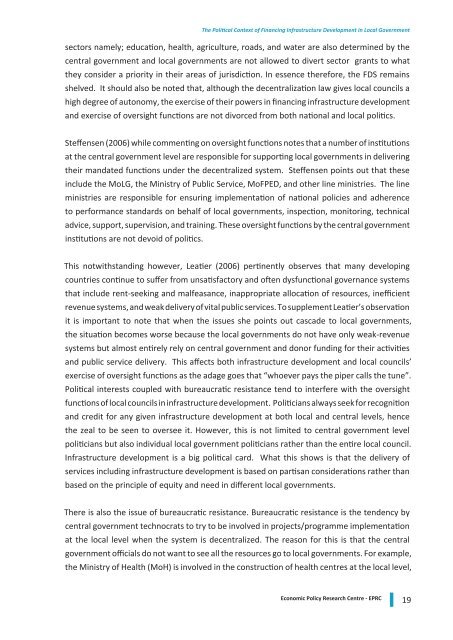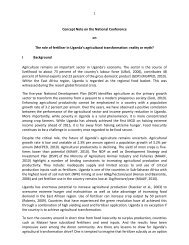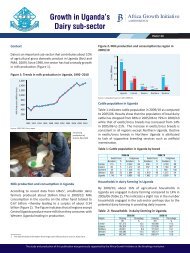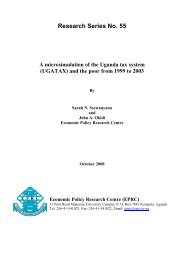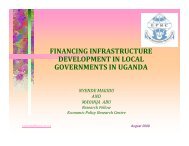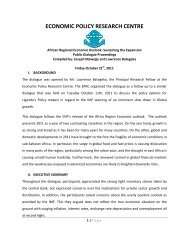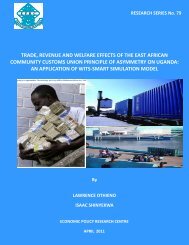The Political Context of Financing Infrastructure Development in ...
The Political Context of Financing Infrastructure Development in ...
The Political Context of Financing Infrastructure Development in ...
Create successful ePaper yourself
Turn your PDF publications into a flip-book with our unique Google optimized e-Paper software.
<strong>The</strong> <strong>Political</strong> <strong>Context</strong> <strong>of</strong> <strong>F<strong>in</strong>anc<strong>in</strong>g</strong> <strong>Infrastructure</strong> <strong>Development</strong> <strong>in</strong> Local Government<br />
sectors namely; education, health, agriculture, roads, and water are also determ<strong>in</strong>ed by the<br />
central government and local governments are not allowed to divert sector grants to what<br />
they consider a priority <strong>in</strong> their areas <strong>of</strong> jurisdiction. In essence therefore, the FDS rema<strong>in</strong>s<br />
shelved. It should also be noted that, although the decentralization law gives local councils a<br />
high degree <strong>of</strong> autonomy, the exercise <strong>of</strong> their powers <strong>in</strong> f<strong>in</strong>anc<strong>in</strong>g <strong>in</strong>frastructure development<br />
and exercise <strong>of</strong> oversight functions are not divorced from both national and local politics.<br />
Steffensen (2006) while comment<strong>in</strong>g on oversight functions notes that a number <strong>of</strong> <strong>in</strong>stitutions<br />
at the central government level are responsible for support<strong>in</strong>g local governments <strong>in</strong> deliver<strong>in</strong>g<br />
their mandated functions under the decentralized system. Steffensen po<strong>in</strong>ts out that these<br />
<strong>in</strong>clude the MoLG, the M<strong>in</strong>istry <strong>of</strong> Public Service, MoFPED, and other l<strong>in</strong>e m<strong>in</strong>istries. <strong>The</strong> l<strong>in</strong>e<br />
m<strong>in</strong>istries are responsible for ensur<strong>in</strong>g implementation <strong>of</strong> national policies and adherence<br />
to performance standards on behalf <strong>of</strong> local governments, <strong>in</strong>spection, monitor<strong>in</strong>g, technical<br />
advice, support, supervision, and tra<strong>in</strong><strong>in</strong>g. <strong>The</strong>se oversight functions by the central government<br />
<strong>in</strong>stitutions are not devoid <strong>of</strong> politics.<br />
This notwithstand<strong>in</strong>g however, Leatier (2006) pert<strong>in</strong>ently observes that many develop<strong>in</strong>g<br />
countries cont<strong>in</strong>ue to suffer from unsatisfactory and <strong>of</strong>ten dysfunctional governance systems<br />
that <strong>in</strong>clude rent-seek<strong>in</strong>g and malfeasance, <strong>in</strong>appropriate allocation <strong>of</strong> resources, <strong>in</strong>efficient<br />
revenue systems, and weak delivery <strong>of</strong> vital public services. To supplement Leatier’s observation<br />
it is important to note that when the issues she po<strong>in</strong>ts out cascade to local governments,<br />
the situation becomes worse because the local governments do not have only weak-revenue<br />
systems but almost entirely rely on central government and donor fund<strong>in</strong>g for their activities<br />
and public service delivery. This affects both <strong>in</strong>frastructure development and local councils’<br />
exercise <strong>of</strong> oversight functions as the adage goes that “whoever pays the piper calls the tune”.<br />
<strong>Political</strong> <strong>in</strong>terests coupled with bureaucratic resistance tend to <strong>in</strong>terfere with the oversight<br />
functions <strong>of</strong> local councils <strong>in</strong> <strong>in</strong>frastructure development. Politicians always seek for recognition<br />
and credit for any given <strong>in</strong>frastructure development at both local and central levels, hence<br />
the zeal to be seen to oversee it. However, this is not limited to central government level<br />
politicians but also <strong>in</strong>dividual local government politicians rather than the entire local council.<br />
<strong>Infrastructure</strong> development is a big political card. What this shows is that the delivery <strong>of</strong><br />
services <strong>in</strong>clud<strong>in</strong>g <strong>in</strong>frastructure development is based on partisan considerations rather than<br />
based on the pr<strong>in</strong>ciple <strong>of</strong> equity and need <strong>in</strong> different local governments.<br />
<strong>The</strong>re is also the issue <strong>of</strong> bureaucratic resistance. Bureaucratic resistance is the tendency by<br />
central government technocrats to try to be <strong>in</strong>volved <strong>in</strong> projects/programme implementation<br />
at the local level when the system is decentralized. <strong>The</strong> reason for this is that the central<br />
government <strong>of</strong>ficials do not want to see all the resources go to local governments. For example,<br />
the M<strong>in</strong>istry <strong>of</strong> Health (MoH) is <strong>in</strong>volved <strong>in</strong> the construction <strong>of</strong> health centres at the local level,<br />
Economic Policy Research Centre - EPRC<br />
19


